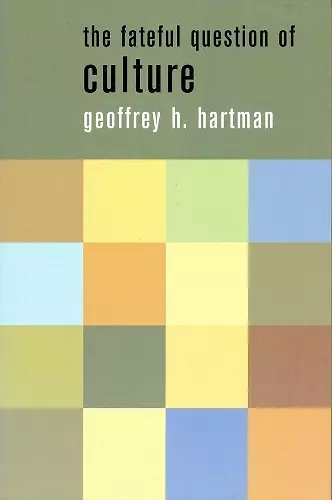The Fateful Question of Culture
Format:Paperback
Publisher:Columbia University Press
Published:12th Jan '99
Currently unavailable, our supplier has not provided us a restock date

One of our most incisive critics asks where the assault against the canons of Western culture has led us. Hartman calls for the restoration of literature to its place as the focus of thinking about culture and for the renewal of aesthetic education to help ensure the balance between art, culture, and politics.
One of our most incisive critics asks where the assault against the canons of Western culture has led us. Engaging a wide range of literature and criticism, Hartman considers the term "culture" and its many uses, and calls for the restoration of literature to its place as the focus of thinking about culture and for the renewal of aesthetic education to help ensure the balance between art, culture, and politics. Lost among the shouts and skirmishes of the "culture wars" is the very idea of culture itself. In this illuminating book, one of our most distinguished critics and scholars asks what the assault against the canons of Western culture has left in its place. If art and literature are largely the products of ideology and interest, how do they matter? And what does the idea of culture mean in today's sprawling, fragmented, critical world where everything -poetry or pornography- gets "read" in the same way? Engaging an extraordinary range of literature, philosophy, social criticism, and popular culture, Geoffrey Hartman probes the meanings and uses of culture in contemporary society. The triumph of cultural studies -and its critiques of bourgeois Eurocentric tradition- is largely complete, Hartman writes. Against the political appropriation of culture, he posits, instead, a definition of culture as public conversation, intellectual and social debate among diverse communities. And against reactionary pressures to impose -or reinstate- a singular culture, or to seek in art or literature an affirmation of group identity, Hartman sketches new roles for human imagination in a postmodern world. For Hartman, the fusion of culture and politics, of whatever ideology, is disastrous. At a time of abstraction, fragmentation, and alienation, art and literature offer wholeness and meaning. But the promise is frought with danger, Hartman argues, in a provocative discussion of the uses of culture as exemplified in the Romantic legacy. He pays special attention to literature's role in reconnecting us to the world. The choice is ours: Wordsworth or Heidegger, literature as shared experience or as reactionary ideology. Hartman ranges widely in these elegant pages. He confronts the shock to the universalistic sense of culture from the Holocaust, as well as the problematic responses of such critic as Adorno and Derrida; explores the poetry of Wordsworth both as a diagnostic...
A complex and deeply-learned meditation about the possibilities of culture. -- John Axcelson, Columbia University The Wordsworth Circle In six tightly reasoned and broadly referenced chapters, Hartman explores the idea of culture, first attempting to define the word and then by exploring how the concept functions in a postmodern world. He makes the case that the purpose of culture is to reduce alienation, the sense of loss resulting from the change from agrarian to industrial society. Hartman sees Wordsworth as not only documenting the change but attempting to translate the value and sense of belonging of the agrarian into the industrial society. On the continent, Heidegger attempts to launch 'an original and originative thinking that will restore language to simplicity and human life to its unalienated place in nature.'... The reduction of the tension between multiculturalism, which does little 'to redeem the imaginative from abstraction,'and cultural identity, which redeems at the price of exclusiveness, is learning. An excellent resource for graduate collections. Choice
ISBN: 9780231114097
Dimensions: unknown
Weight: unknown
272 pages